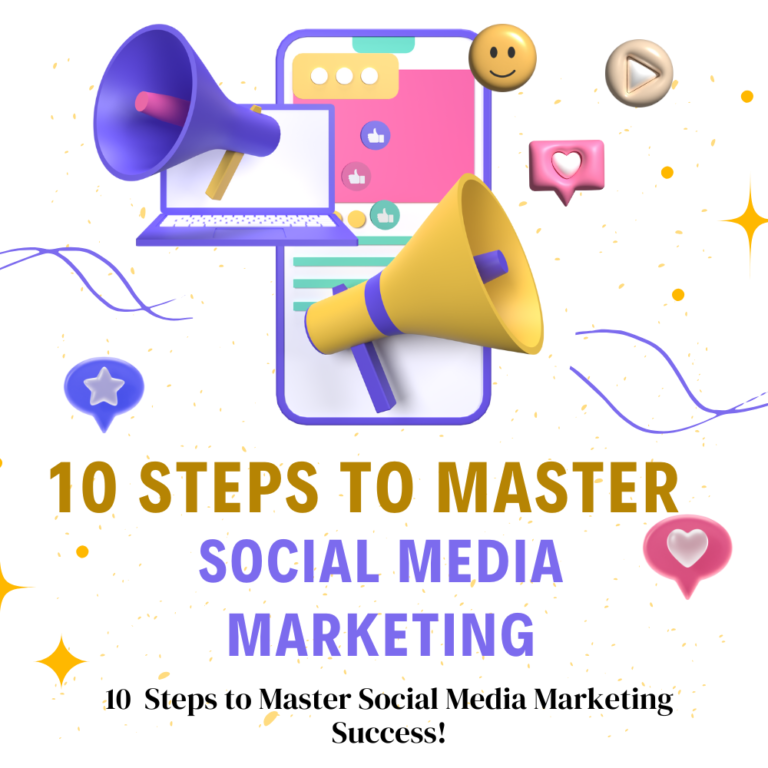Why Digital Marketing is Important in 2024: A Comprehensive Guide
In 2024, the digital landscape has evolved dramatically, shaping how businesses interact with consumers.
With new technologies, changing consumer preferences, and an increasingly competitive market, digital marketing has become the cornerstone of modern business strategies.
This blog will explore why digital marketing is more critical than ever in 2024, focusing on the latest trends and innovations that marketers must embrace for success.
From the rise of AI and voice search to the importance of personalized marketing, video content, and sustainability, the role of digital marketing services has never been more essential.

Table of Contents
- The Evolving Digital Landscape
- AI and Automation in Marketing
- The Power of Voice Search
- Chatbots and Customer Engagement
- Personalized Marketing: Reaching the Right Audience
- The Rise of Video Marketing
- Social Commerce: The Intersection of Social Media and E-commerce
- The Influence of Influencers
- Virtual Reality (VR) in Digital Marketing
- Sustainability: A Growing Consumer Demand
- Big Data and Marketing Analytics
- Conclusion: Adapting to the Future of Marketing
1. The Evolving Digital Landscape
Digital marketing has transformed how businesses promote their products and services, moving from traditional methods like print ads and billboards to digital platforms like websites, social media, and email.
In 2024, digital marketing services encompass an even broader spectrum, with online marketing being more dynamic and interactive than ever before.
Key factors driving this shift include:
- Increased internet accessibility and mobile device usage
- A shift in consumer behavior toward online shopping and digital interactions
- Emerging technologies like , augmented reality, (AR), artificial intelligence (AI) and virtual reality (VR)
The digital world is now a space where consumers spend a significant amount of time, and businesses must adapt by leveraging these platforms to reach their target audiences.
2. AI and Automation in Marketing
Artificial Intelligence (AI) is at the forefront of digital marketing in 2024. It’s revolutionizing how businesses interact with their customers and how they optimize their marketing strategies.
AI-driven tools such as machine learning algorithms, predictive analytics, and automation platforms help businesses better understand their audience, personalize content, and improve campaign effectiveness.
Key AI applications in digital marketing services include:
- Automated content creation: AI can now generate content for blogs, emails, and social media posts, helping marketers save time and maintain consistent messaging.
- Predictive analytics: AI can predict customer behavior, helping businesses optimize their campaigns for better conversion rates.
- Personalized recommendations: AI tools analyze user data to deliver personalized product recommendations, improving customer satisfaction and sales.

AI allows businesses to automate repetitive tasks, freeing up time to focus on creative strategy and enhancing customer experience.
Automation tools such as email marketing platforms and customer relationship management (CRM) systems make it easier to manage large-scale campaigns with personalized touches.
3. The Power of Voice Search
With the rise of smart speakers and voice assistants like Siri, Alexa, and Google Assistant, online marketing in 2024 must account for voice search optimization.
Voice search is becoming increasingly popular as it offers convenience and speed for users.
Studies show that more than 50% of all searches in 2024 are expected to be conducted via voice.
Key aspects of voice search optimization include:
- Conversational keywords: Unlike traditional searches, voice searches are more conversational, meaning marketers must optimize content for natural language queries.
- Featured snippets: Securing the top spot on search engine results pages (SERPs) is crucial for voice search, as these results are often read aloud by voice assistants.
- Local SEO: Many voice searches have local intent, such as “restaurants near me.” Businesses should optimize their content for local search queries to capitalize on this trend.
Incorporating voice search optimization into DIG helps businesses reach a broader audience, especially those who prefer hands-free browsing.
4. Chatbots and Customer Engagement
In 2024, chatbots have become an integral part of customer service and digital marketing strategies.
Chatbots are AI-powered tools that can handle customer queries, offer personalized recommendations, and guide users through the buying process—all in real-time.
Benefits of using chatbots include:
- 24/7 customer support: Chatbots can provide instant responses to customer inquiries at any time of the day, improving customer satisfaction and engagement.
- Lead generation: Chatbots can collect user data and qualify leads by asking relevant questions, which can then be passed on to sales teams for follow-up.
- Cost efficiency: By automating customer service tasks, businesses can reduce the need for human resources, cutting operational costs.
Integrating chatbots into digital marketing services not only enhances customer experience but also allows businesses to provide a seamless interaction from the moment a visitor lands on their website.

5. Personalized Marketing: Reaching the Right Audience
In 2024, consumers anticipate customized experiences that cater to their individual preferences and behaviors.
Personalized marketing involves using customer data to create customized content and offers that resonate with individual users.
With the rise of big data and AI, personalized marketing has become more sophisticated, enabling businesses to deliver hyper-targeted campaigns.
Key elements of personalized marketing include:
- Dynamic content: Personalized emails, website experiences, and social media ads that change based on user behavior.
- Customer segmentation: Dividing the audience into specific groups based on demographics, purchase history, and engagement levels.
- Behavioral targeting: Using data on user behavior to predict future actions and tailor marketing efforts accordingly.
The more personalized the marketing message, the more likely it is to convert.
Businesses leveraging personalization in their online marketing efforts will see higher engagement, improved customer loyalty, and increased sales.
6. The Rise of Video Marketing
In 2024, Video content dominates the digital market. Platforms like YouTube, TikTok, and Instagram Reels have made short-form video content more popular than ever.
Video is highly engaging, easy to consume, and versatile—making it an essential tool for businesses looking to capture their audience’s attention.
Why video marketing is important:
- Higher engagement: Videos generate more shares, comments, and likes compared to text or image-based posts.
- Improved SEO: Websites with video content are more likely to rank higher on search engines, as Google prioritizes engaging content.
- Increased conversions: Placing a video on a page can increase conversion rate by 75%.
Incorporating video into your digital marketing services allows you to tell compelling stories, showcase products, and connect with your audience on a deeper level.

7. Social Commerce: The Intersection of Social Media and E-commerce
Social commerce is rapidly growing in 2024, with platforms like Instagram, Facebook, and TikTok allowing users to make purchases directly within the app.
This seamless integration of social media and e-commerce has revolutionized how consumers discover and buy products.
Key features of social commerce include:
- Shoppable posts: Businesses can tag products in their posts, allowing users to click and purchase without leaving the platform.
- Live shopping events: Brands host live streams where users can purchase products in real-time.
- User-generated content: Consumers trust recommendations from peers, making user-generated content a powerful tool for driving sales.
Social commerce allows businesses to capitalize on the power of social media to drive conversions, making it a critical component of online marketing strategies.
8. The Influence of Influencers
Influencer marketing continues to be a powerful strategy in 2024, with brands partnering with influencers to reach new audiences and build credibility.
Trendsetters have dedicated followers who trust their advice and become partners in promoting products and services.
Types of influencers include:
- Macro-influencers: Individuals with large followings (100k+), often celebrities or industry leaders.
- Micro-influencers: Individuals with smaller, highly engaged audiences (10k-100k), often considered more authentic and relatable.
- Nano-influencers: Individuals with niche followings (1k-10k), known for their close relationships with their audience.
Brands that leverage influencer partnerships in their digital marketing services can reach highly targeted audiences and drive authentic engagement.

9. Virtual Reality (VR) in Digital Marketing
Virtual reality is no longer a futuristic concept—it’s a reality in 2024. VR allows consumers to experience products and services in immersive ways, whether it’s through virtual showrooms, product demonstrations, or interactive advertisements.
Applications of VR in online marketing include:
- Virtual tours: Real estate agents can offer virtual home tours, allowing potential buyers to explore properties from the comfort of their own homes.
- Interactive ads: Brands can create interactive VR ads that allow users to engage with products in a virtual environment.
- Virtual events: Brands can host virtual conferences, product launches, and other events, offering an immersive experience for attendees.
Incorporating VR into your digital marketing services can set your brand apart and create memorable experiences for your audience.
10. Sustainability: A Growing Consumer Demand
In 2024, sustainability has become a key consideration for consumers, with more people prioritizing eco-friendly products and ethical business practices.
Brands that align themselves with sustainability initiatives can build trust and loyalty with environmentally conscious consumers.
Ways to incorporate sustainability into digital marketing:
- Promote eco-friendly products: Highlight the sustainability aspects of your products or services in your marketing campaigns.
- Green packaging: Share your efforts to reduce waste by using eco-friendly packaging or shipping methods.
- Social responsibility: Showcase your brand’s commitment to ethical sourcing, fair labor practices, and charitable initiatives.
By addressing sustainability in your online marketing strategies, you can attract a growing segment of eco-conscious consumers and differentiate your brand in a competitive market.

11. Big Data and Marketing Analytics
Big data has become a game-changer in digital marketing services.
In 2024, businesses have access to more data than ever before, allowing them to make data-driven decisions that improve marketing performance and ROI.
Benefits of big data in marketing:
- Enhanced targeting: By analyzing customer data, businesses can identify patterns and trends that help them target the right audience with the right message.
- Performance tracking: Marketing analytics tools provide insights into campaign performance, enabling businesses to optimize their strategies for better results.
- Predictive modeling: Using big data, marketers can predict future customer behavior and make proactive decisions to improve customer experience.
Leveraging big data in your digital marketing efforts allows you to create more effective campaigns, improve customer satisfaction, and achieve better business outcomes.
12. Conclusion: Adapting to the Future of Marketing
As we move further into 2024, the importance of digital marketing services cannot be overstated. From AI and voice search to video marketing and sustainability, the digital marketing landscape is constantly evolving. Businesses that embrace these trends and technologies will be better positioned to succeed in an increasingly competitive market.
Whether you’re a small business owner or a large corporation, adopting a forward-thinking approach to online marketing will ensure your brand stays relevant, engages your audience, and drives growth in the years to come. The future of digital marketing begins here—Be ready to integrate it?






